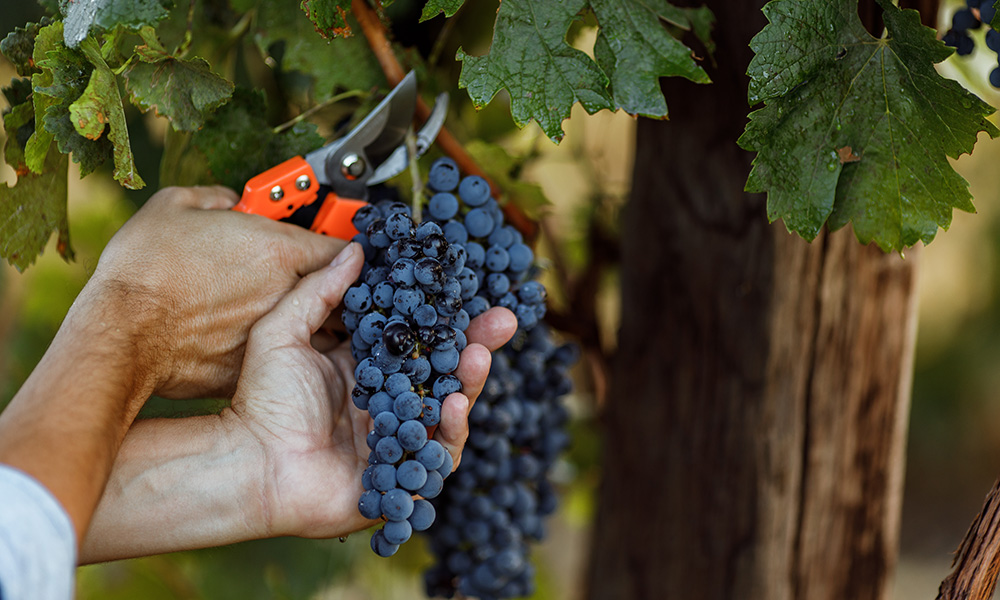
Giving your guests the chance to participate in agricultural workshops or hands-on activities are just some of the ways wineries can create an authentic and memorable holiday, new research from UBC Okanagan suggests.
Establishing a sense of place—letting visitors dig right into the soil and smell the earth where the grapes are grown for their wine—is one strategy wineries can use to revive lagging tourism numbers coming out of the pandemic, new research from UBC Okanagan reveals.
Research Associate Darcen Esau and supervisor Dr. Donna Senese, an Associate Professor in Geography in the Irving K. Barber Faculty of Arts and Social Sciences, collaborated on new research published recently in the journal Food Quality and Preference.
“It really does come down to ensuring people understand that wine tourism is a multi-sensory experience,” says Esau.
The findings come thanks to research focused on Italy’s renowned Tuscany wine region in 2018.
Finding “slow, small and local” is what wine tourists crave on vacation, and is what makes Tuscany a world leader in wine tourism. It also provides a simple framework others can follow regardless of where in the world they are located.
“We often think of tourism as just being visual, at just looking at the landscape,” Esau says. “It’s about engaging all five of our senses through participation at a working farm and actually getting a little mud under your fingernails, touching the vines, smelling the wine cellar or hearing a tractor drive by.”
The feeling of being part of an agricultural lifestyle can be accomplished through workshops or hands-on activities. It is this participation in agricultural activity that helps vacationing visitors escape, which makes the whole experience feel more authentic and memorable, he explains.
Esau wanted to understand how the sensory experience of wine tourism can create a unique association with a wine destination, providing memorable experiences that are both unique and authentic. Much of that investigating was done during a four-week trip to Castello Sonnino winery in the valleys of Central Italy. Yes, spending a month on a working vacation at a Tuscan winery is part of a class offered at UBCO.
But the winery is also an education centre and provides lessons to the world, Dr. Senese says.
Dr. Senese, who conducts research with UBC’s Wine Research Centre, has led UBC courses in the Chianti wine appellation four times to study the connections between wine, food and tourism in the sustainability of the region’s geography.
She calls Esau’s findings eye-opening, and further confirmation of what she has held dear for the past 20 years. Respecting place is at the heart of every geographer, like her, and she wants the wine industry to embrace a holistic approach in their thinking.
“It is sensual on all five levels,” she says. “For our students, one of the standouts about visiting a lot of those wineries in Tuscany, and the experiences they have, is the breathtaking passion the people at the wineries have for the product and the place.
“It’s odd to see tears coming to the eyes of students going, ‘Wow. I haven’t had this experience before, and these people are so passionate about what they’re doing.’”
The research comes at an especially important time for a wine industry attempting to recover from a global pandemic. According to a study commissioned by Wine Growers British Columbia and released in mid-August, wine-related tourism in the Okanagan declined to 254,000 visits in 2020 from 1.2 million in 2019.
Dr. Senese is quick to encourage smaller wine regions, such as the Okanagan Valley, to embrace the findings and give their visitors the full sensory experience. After all, many small wineries rely on tourists and local tastings rather than flooding global markets with exported products.
At the same time, the research also applies to all wine regions regardless of their numbers as they seek to drive tourism and subsequent visitation.
“It really is about downplaying that commercial component and emphasizing the local craftsmanship,” says Esau, “which a large winery can do as well. We see great examples of it throughout the Okanagan.”